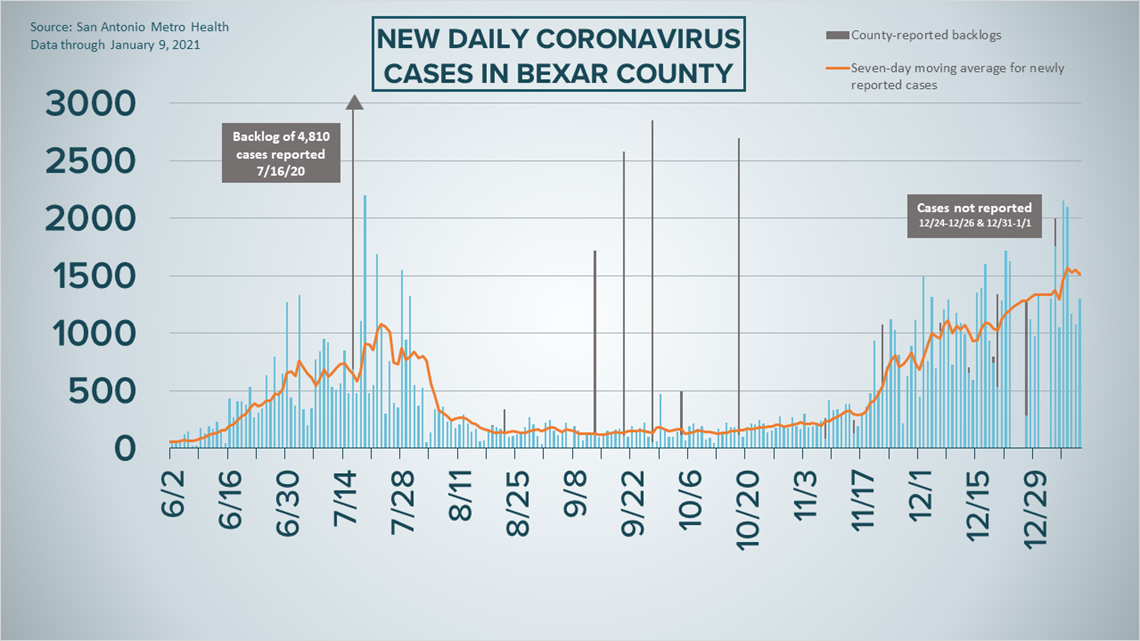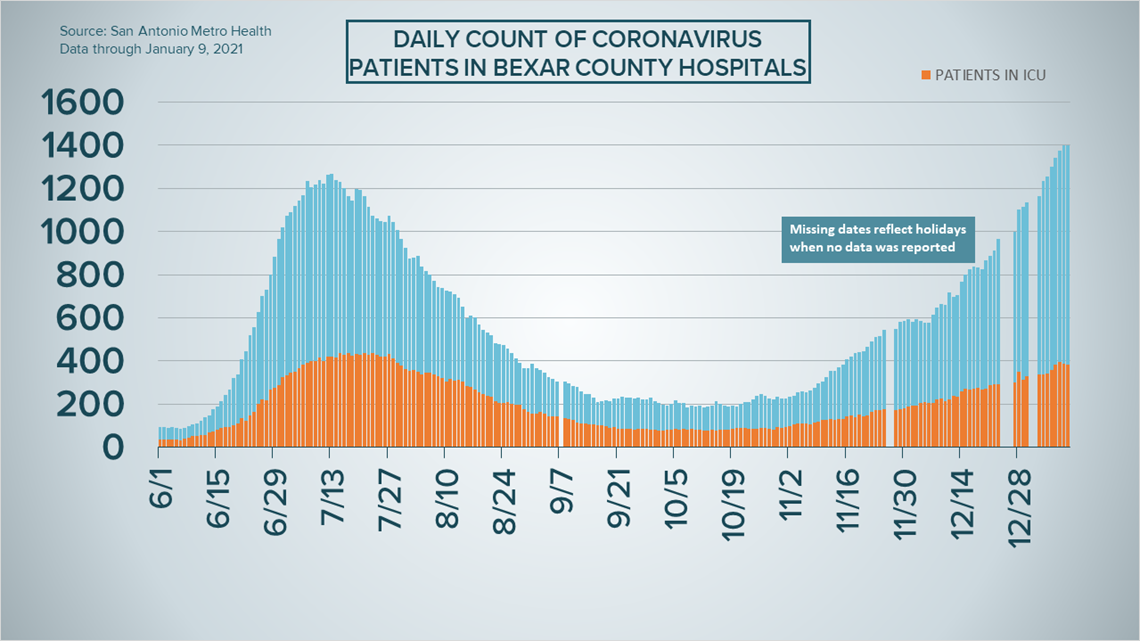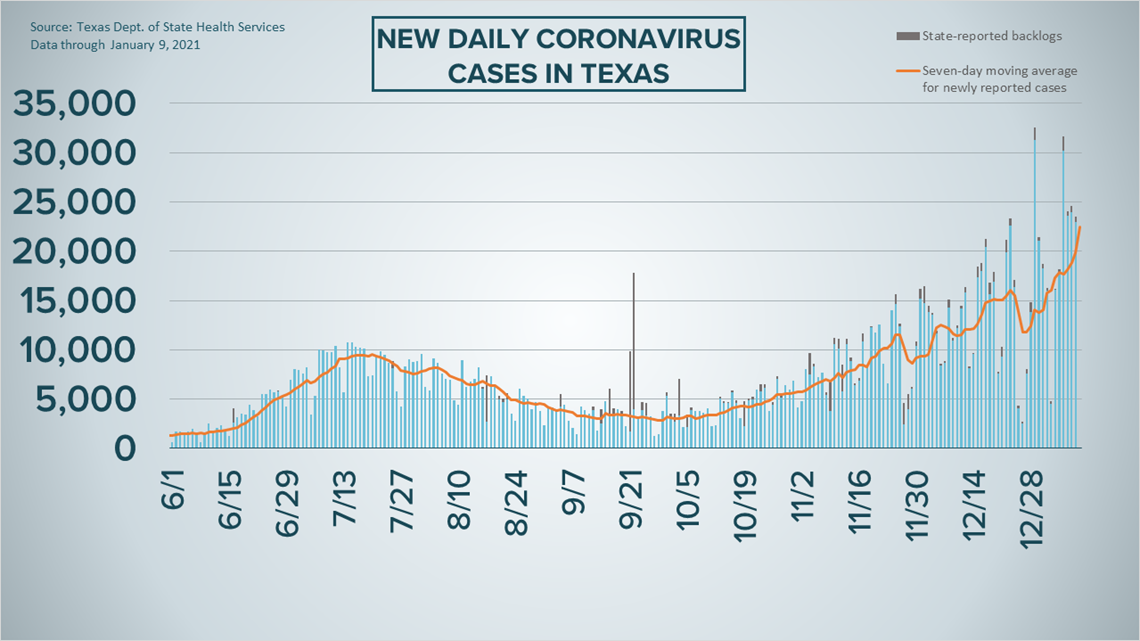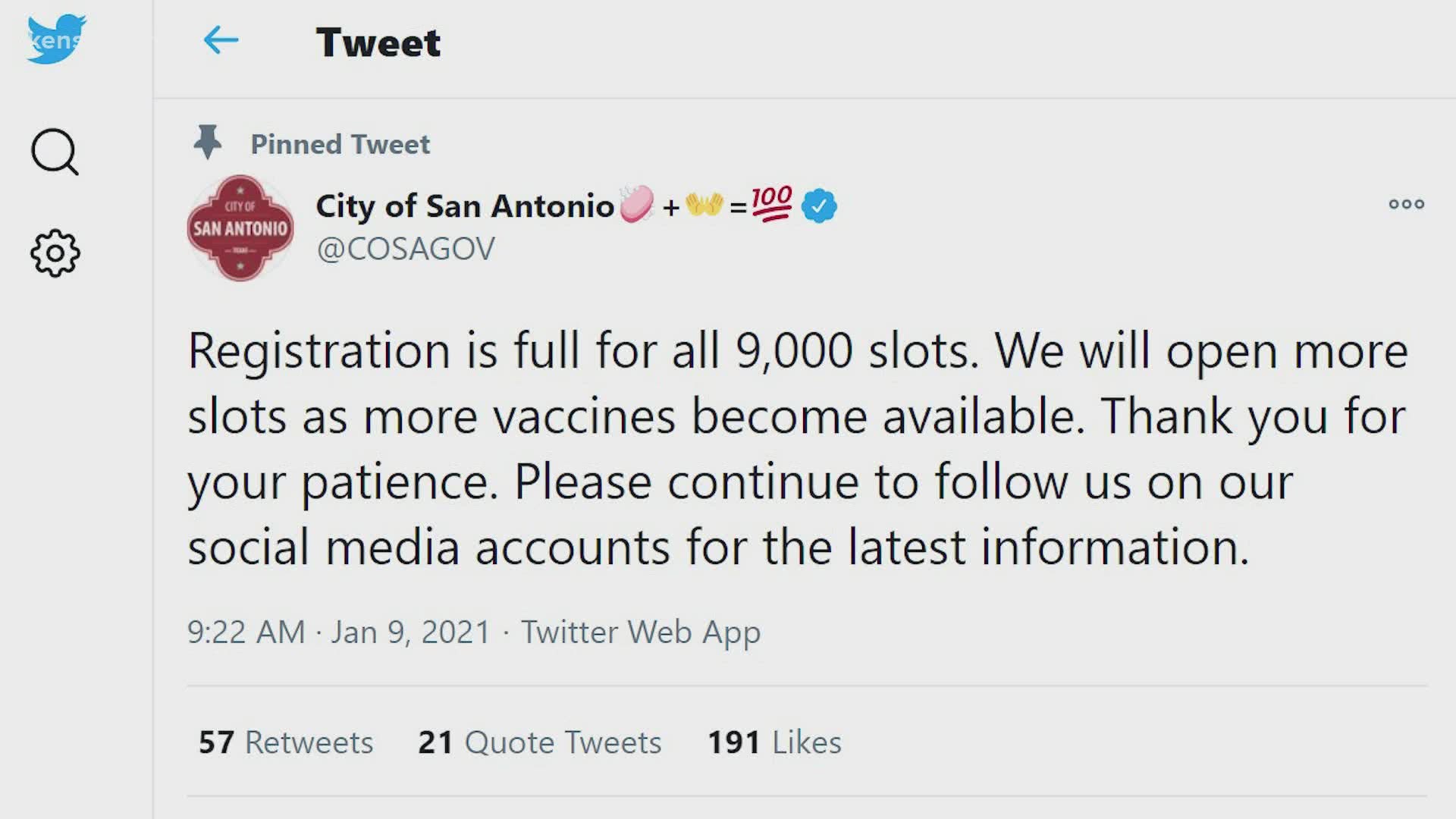SAN ANTONIO — We're tracking the latest numbers from the coronavirus pandemic in San Antonio and across Texas. Here are the latest numbers reported by Bexar and surrounding counties:
- Bexar County: On Saturday, 1,301 new cases were reported, bringing the total number of cases to 130,447. One new death was also reported, bringing the local death toll from coronavirus complications to 1,593.
- Hays County: In their last report released Friday, officials in Hays County, reported 257 new cases in the county and one additional COVID-related fatality. As of Friday, there are a total of 11,545 lab-confirmed local cases (1,808 of which are active), while the death toll rose to 138. 9,599 residents have recovered from the virus.
- Comal County: In their last report released Friday, Comal County officials on Friday reported 86 new cases and six additional COVID-related fatalities. There are a total of 6,792 cases, including 3,976 confirmed and 2,805 probable cases, while 186 county residents have died due to COVID-19 complications. The county estimates 5,827 residents have recovered, while 779 are still ill with the virus.
More county case information is available through the Texas Department of Health Services COVID-19 dashboard.
Stay updated with our latest information on coronavirus vaccines and local vaccine distribution with our ongoing Vaccine Tracker.
How Bexar County is trending
We've tracked how many coronavirus cases have been confirmed in Bexar County from the time officials began reporting cases in March 2020. The graphic below shows the number of cases since June and charts those daily case numbers along a 7-day moving average to provide a more accurate picture of the overall coronavirus case curve in our area and the direction we're trending amid the pandemic.
On Saturday evening, Metro Health reported an additional 1,301 cases of the novel coronavirus in Bexar County. The seven-day rolling average for newly-reported cases dipped slightly to 1,516 cases per day.
130,447 county residents have now tested positive for COVID-19.
Metro Health also reported one more coronavirus-related death in the community. In all, 1,593 Bexar County residents have died from COVID-19 complications.
More than 12,000 county residents have tested positive for COVID-19, while 47 residents have died since the start of 2021.


Hospitalizations in Bexar County inched even closer to the 1,400 patient mark. On Saturday, a total of 1,399 coronavirus patients were receiving treatment for their symptoms at local facilities. Of those, 381 are in intensive care and 213 are on ventilators.


Coronavirus in Texas
The total number of novel coronavirus cases in the state since the pandemic began grew by 23,290 on Saturday, according to the Texas Department of State Health Services. That total includes 18,861 new confirmed cases, 3,837 new probable cases and 592 cases attributed to backlogs not previously reported in the state's total (more details can be found at the top of this page).
As of Saturday, more than 1.938 million Texans have been diagnosed with COVID-19.


State health authorities also reported 381 additional virus-related deaths on Saturday. At least 29,691 Texans have now died from COVID-19 complications. Since the start of the new year, more than 2,100 Texas residents have perished after contracting the virus.
Meanwhile, the number of Texans receiving treatment at hospitals for coronavirus symptoms on Saturday rose to 13,935, marking yet another record high. The daily number of coronavirus hospitalizations in the Lone Star State has risen by more than 1,400 since the start of 2021, and hospitalizations have risen by 11.6% since the start of the year.
The state estimates that about 1.549 million Texans have recovered, while 344,221 Texans remain ill with COVID-19.
The latest update from the Texas Education Agency showed that there have been at least 102,558 cumulative cases among staff and students across the state through January 3. That number comprises 64,574 positive student cases and 38,011 staff cases. More information can be found here.
The TEA releases new data on school cases on Fridays.
Latest Coronavirus Headlines
- All 9,000 COVID-19 vaccine appointments at free Alamodome clinic filled in six minutes
- Member of famed Tuskegee Airmen dies from coronavirus
- Coroner reviewing doctor's death 2 weeks after vaccine
- Vaccine distribution in Texas lags behind other states. Here is how one company aims for efficiency
- Researchers study how COVID stress in pregnant women may impact baby's health and development
- Pfizer vaccine effective against coronavirus variants, study suggests
- Key Democratic senator shoots down $2,000 stimulus checks proposal
Coronavirus symptoms
The symptoms of coronavirus can be similar to the flu or a bad cold. Symptoms include fever or chills, cough, shortness of breath or difficulty breathing, fatigue, muscle or body aches, headache, new loss of taste or smell sore throat, congestion or runny nose, nausea or vomiting, and diarrhea, according to the Centers for Disease Control.
Most healthy people will have mild symptoms. A study of more than 72,000 patients by the Centers for Disease Control in China showed 80 percent of the cases there were mild.
But infections can cause pneumonia, severe acute respiratory syndrome, kidney failure, and even death, according to the World Health Organization. Older people with underlying health conditions are most at risk.
But infections can cause pneumonia, severe acute respiratory syndrome, kidney failure, and even death, according to the World Health Organization. Older people with underlying health conditions are most at risk.
Experts determined there was consistent evidence these conditions increase a person's risk, regardless of age:
- Chronic kidney disease
- COPD (chronic obstructive pulmonary disease)
- Obesity (BMI of 30 or higher)
- Immunocompromised state (weakened immune system) from solid organ transplant
- Serious heart conditions, such as heart failure, coronary artery disease, or cardiomyopathies
- Sickle cell disease
- Type 2 diabetes
The CDC believes symptoms may appear anywhere from two to 14 days after being exposed.
Human coronaviruses are usually spread...
- Between people who are in close contact with one another (within about 6 feet).
- Through respiratory droplets produced when an infected person coughs, sneezes or talks. These droplets can land in the mouths or noses of people who are nearby or possibly be inhaled into the lungs.
- Some recent studies have suggested that COVID-19 may be spread by people who are not showing symptoms.
Help stop the spread of coronavirus
- Stay home when you are sick.
- Eat and sleep separately from your family members
- Use different utensils and dishes
- Cover your cough or sneeze with your arm, not your hand.
- If you use a tissue, throw it in the trash.
Find a Testing Location
City officials recommend getting a COVID-19 test if you experience fever or chills, cough, shortness of breath or difficulty breathing, fatigue, muscle or body aches, headache, new loss of taste or smell, sore throat, congestion or runny nose, nausea or vomiting, or diarrhea.
San Antonio operates several no-cost testing locations, including two walk-up locations open Monday-Sunday from 10 a.m. until 2 p.m.:
Cuellar Community Center
5626 San Fernando St.
San Antonio, TX 78237
Ramirez Community Center
1011 Gillette Blvd.
San Antonio, TX 78224
Additionally, Freeman Coliseum offers drive-through no-cost testing from Monday through Sunday between 9 a.m. and 4 p.m. An appointment is required and can be made either online or by calling (833) 213-0643.
Here's a Testing Sites Locator to help you find the testing location closest to you in San Antonio. And here are the dates and times that city-run testing sites will be operating over the holidays.

